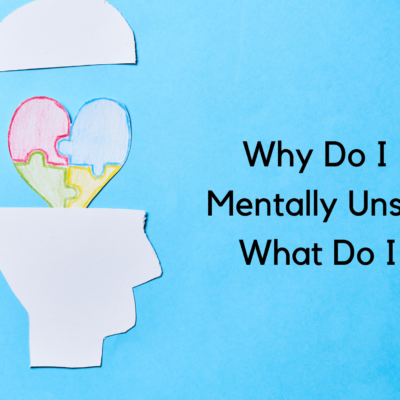Why Do I Feel Mentally Unstable: There comes a time when we find ourselves struggling with an overwhelming sense of mental instability. This experience can be both puzzling and distressing, leaving many to find the reasons behind their emotional turmoil. So, here in this article, we will talk about the multifaceted nature of mental instability, sharing potential reasons and giving practical strategies to deal with these challenging emotions.
Also Read:
Understanding Mental Health:
Understanding mental health is like acknowledging that we all experience different feelings. You can think of mental health like a scale – some people feel really good, while others might feel a bit less good.
Just as our bodies can feel better or worse, our minds can too, and it depends on lots of things happening inside and around us. Mental health is not just feeling one way all the time; it is more like a different kind of feeling that we all go through.
What Are The Signs of Mental Instability?
The first step in handling mental instability is identifying its signs. These may arise differently for each person but can include constant feelings of sadness, anxiety, irritability, changes in sleep patterns, hunger changes, and problems concentrating. It is important to identify that experiencing mental instability does not mean weakness; instead, it is a sign that our mental health requires attention and care.
Why Do I Feel Mentally Unstable?
Stress and Overwhelm
Extreme stress from different life events, such as work pressure, relationship issues, or financial strain, can contribute to mental instability. Recognizing and handling sources of stress is important in maintaining emotional well-being.
Unresolved Trauma
Past traumas, whether big or small, can stay in the subconscious and manifest as mental instability. Seeking therapy or counseling to handle and process unresolved trauma is an important step toward healing.
Chemical Imbalances
Neurotransmitter imbalances in the brain can contribute to mental health challenges. Conditions such as depression and anxiety may be linked to disturbances in the delicate balance of brain chemicals. You should consult with a mental health professional to help find appropriate treatment options.
Social Isolation
Humans are social beings, and isolation or a lack of meaningful connections can lead to feelings of loneliness and instability. Developing a support network and engaging in social activities can be helpful.
Lifestyle Factors
Poor sleep, insufficient nutrition, and lack of physical activity can affect mental health. Prioritizing a healthy lifestyle with good sleep, a balanced diet, and regular exercise can contribute to emotional well-being.
Seeking Professional Support
When feelings of mental instability continue, seeking professional support is a necessary and courageous step. Mental health professionals, including therapists, counselors, and psychiatrists, are qualified to provide guidance, support, and evidence-based interventions to deal with personal needs.
Opening up about one’s struggles does not symbolize weakness but instead strength in acknowledging the necessity for assistance in handling the complexities of the mind.
How to Deal With Mental Instability:
Mindfulness and Meditation
Integrating mindfulness practices and meditation into daily routines can encourage emotional well-being. These practices help develop an awareness of the present moment and can deliver a break from racing thoughts.
Expressive Writing
Journaling thoughts and emotions can act as a therapeutic outlet. Writing can help people process their feelings, gain clarity, and track patterns in their mental health.
Setting Routine
Creating a structured day-to-day routine can bring a sense of stability and predictability. This includes regular sleep patterns, meal times, and selected periods for work, leisure, and self-care.
Connecting with Others
Building and promoting positive social connections is important for mental health. Sharing experiences with trusted friends, family, or support groups can provide a sense of understanding and empathy.
Engage Yourself in Hobbies
Following activities that bring joy and fulfillment can act as a balance to mental instability. Hobbies provide a healthy way to deal with stress and contribute to a sense of purpose and achievement.
Normalize Talking About Mental Health
It is important to normalize discussions related to mental health, promoting an environment where people feel comfortable seeking help without fear of judgment. Recognizing mental health as a fair part of overall well-being helps break down barriers and promotes open conversations about the challenges many face.
At The End
In the complicated world of mental health, recognizing and addressing feelings of instability is a important step toward healing and growth. Mental instability is a shared human experience, and through empathy, understanding, and proactive steps, we can work towards creating a more supportive and understanding society that prioritizes mental well-being.








